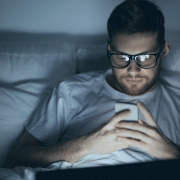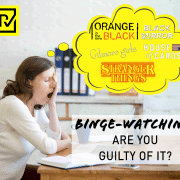Blue light casts a new light on sleep deficiency
 Sleep is affected by many things. When you think of what affects your sleep, the usual suspects are things like caffeine, alcohol, stress, noise. What has come to light (pun intended) is our increased use of artificial light which is affecting our sleep. It may be time to question Thomas Edison when he reassured that electric light ‘is in no way harmful to health, nor does it affect the soundness of sleep’
Sleep is affected by many things. When you think of what affects your sleep, the usual suspects are things like caffeine, alcohol, stress, noise. What has come to light (pun intended) is our increased use of artificial light which is affecting our sleep. It may be time to question Thomas Edison when he reassured that electric light ‘is in no way harmful to health, nor does it affect the soundness of sleep’
Our body’s biological clockwork around circadian rhythms, which are affected by the amount of light and dark we are exposed to. Our organs even function to these rhythms, which determine our sleep, feeding patterns, brain activity, hormone production and the effectiveness of cell regeneration. Sleep affects our lives in so many ways – mood, hunger, stress and energy which affects how much we move.
If we lived purely in natural light, our brain would signal the body to start releasing sleep hormones, like melatonin when it started to get dark outside. Our temperature would drop which would start the sleep process. When it got light again, our temperature would rise and our body would start producing hormones like cortisol to wake us up (1).
When our bodies are exposed to artificial light, such as LED’s and screen lights, we are confusing it and all these natural processes are disrupted. The body doesn’t know when it’s time to get ready for sleep and stays alert.
Studies have shown that melatonin is suppressed by approximately 85 percent when it’s exposed to room light during the night compared with dim light (2).
With more blue light in our lives emitted by room lights and screens, our quality and duration of our sleep is negatively affected (3). Although we are staying up later on computers, watching TV or on our mobiles, it’s also the blue light we are exposed to during the day that is impacting our circadian rhythm and therefore our sleep (4). Sleep deprivation has a powerful impact on our overall wellness and there is a lot of evidence to support it (5).
We live in the modern world, so it’s not realistic to start living purely in natural light. There are a few things you can do to limit your exposure and improve your quality of sleep.
TIPS ON LIMITING EXPOSURE TO BLUE LIGHT
- Turn off all your devices at least one hour before you go to bed. Try not to keep your mobile phone next to your bed to avoid the temptation to check it. Read a book, take a bath or have a no-screen wind-down routine.
- Turn lights off gradually at night, or use a dimmer switch.
- Use orange or red light bulbs in lamps (found in most hardware stores) instead of bright room lights.
- Consider red or orange tinted glasses while looking at screens.
- Use Nightshift if you have an iPhone and MacBook. This is a setting which makes the colours on your screen warm. Most smartphones have the night option – look for it under settings. Set a time for it to automatically switch on and off so you don’t have to always remember.
- Turn daytime lights off if possible and spend as much time as you can in natural light. If you can’t, there are lights that mimic natural light that can help.
Sweet dreams!
References:
(1) https://sleepfoundation.org/bedroom/see.php
(2) https://academic.oup.com/jcem/article/96/3/E463/2597236
(3) https://www.sciencedaily.com/releases/2017/08/170822103434.htm
(4) https://www.sciencedaily.com/releases/2014/02/140203191841.htm
(5) https://academic.oup.com/nutritionreviews/article-abstract/65/suppl_3/S244/1911960



